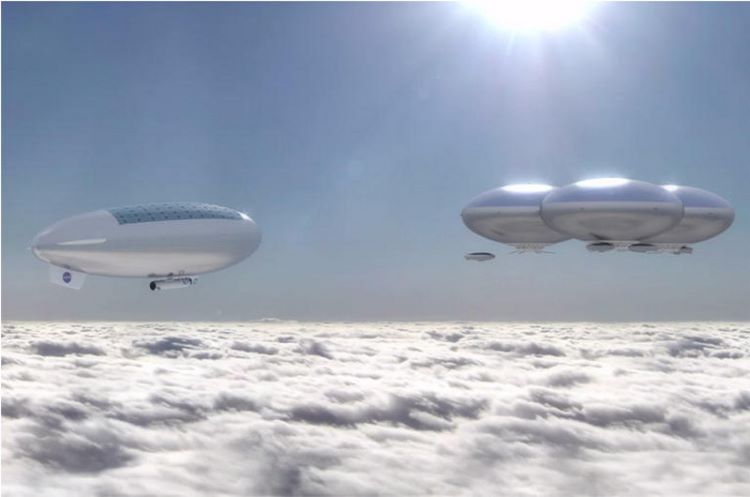NASA is preparing to send humans back to the Moon with the Artemis missions in the next few years as part of the agency’s Moon to Mars Architecture with the long-term goal of landing humans on the Red Planet sometime in the 2030s or 2040s. But what about sending humans to other worlds of the Solar System? And, why not Venus? It’s closer to Earth than Mars by several tens of millions of kilometers, and despite its extremely harsh surface conditions, previous studies have suggested that life could exist in its clouds . In contrast, we have yet to find any signs of life anywhere on the Red Planet or in its thin atmosphere.
So, should we send humans to Venus? “Yes, we should send humans to Venus,” Dr. Paul Byrne, who is an Associate Professor of Earth, Environmental, and Planetary Sciences at Washington University in St. Louis, tells Universe Today .
“But first, let’s talk about what ‘sending humans to Venus’ actually means. The surface of Venus is hellish, so nobody would last long there nor volunteer to go. Above the clouds, the temperature and pressure are almost like a nice spring day here on Earth, so aside from tiny sulphuric acid cloud droplets you’d be okay (with a breathing apparatus).
” These “hellish” conditions that Dr. Byrne alludes to are the extreme conditions across the surface of Venus , including surface pressures 92 times that of Earth’s surface and average surface temperatures of approximately 464 degrees Celsius (867 degrees Fahrenheit). In contrast, Earth’s average surface temperatures are a calm 15 degrees Celsius (59 degrees Fahrenheit).
These extreme pressures and temperatures have made landing on the surface of Venus even more difficult, as the former Soviet Union continues to be the only nation to have successfully landed on Venus’ surface, having accomplished this feat with several of their Venera and Vega missions. However, the longest mission duration for the lander was only 127 minutes ( Venera 13 ), which also conducted the first sound recording on another planet. “If we were to send humans to Venus, they’d be going in a spacecraft that would fly by the planet en route somewhere else,” Dr.
Byrne tells Universe Today . “If we were to one day send humans actually to Venus itself for science and engineering purposes, then a cloud-based habitat is the way to go. Getting humans onto the Venus surface is going to require so much technology and expense that, for the foreseeable future, I don’t think anyone will think it worth doing.
” A 2015 study presented at the AIAA Space and Astronautics Forum and Exposition outlined a NASA study for the High Altitude Venus Operational Concept (HAVOC) mission that would involve a 30-day crewed mission using an airship equipped with solar panels within the upper atmosphere of Venus. This is because Venus’ upper atmosphere at approximately 50 kilometers (30 miles) above the surface exhibits much more hospitable conditions, including temperatures between 30 to 70 degrees Celsius (86 to 158 degrees Fahrenheit) and pressures very close to that of Earth. However, Dr.
Byrne refers to HAVOC as an “unbelievably expensive concept”. As for using Venus while en route to another location in the Solar System, Venus has been used on several occasions to slingshot spacecraft to the outer Solar System as well as for exploration of the inner Solar System, such as Mercury and the Sun. For example, NASA’s Galileo and Cassini spacecraft used gravity assists at Venus while en route to Jupiter and Saturn, respectively, while NASA’s MESSENGER and the European Space Agency’s (ESA) BepiColombo spacecraft used gravity assists at Venus while en route to Mercury.
Additionally, NASA’s Parker Solar Probe and the ESA Solar Orbiter used gravity assists at Venus for orbital adjustments to explore the Sun. “Once within close proximity to Venus, astronauts could remotely operate spacecraft, landers, or even aircraft to conduct valuable science before moving out of range again,” Dr. Byrne tells Universe Today .
“But to be clear, the real value for such a mission would be as part of learning how to live and work in deep space en route to distant destinations, i. e. , Mars.
That’s something I don’t think we’re talking enough about yet when we think about sending humans, one day, to the Red Planet. ” Will we ever send humans to Venus? Will it be a cloud or surface mission, and what can we learn from doing it? Only time will tell, and this is why we science! As always, keep doing science & keep looking up!.
From: universetoday
URL: https://www.universetoday.com/164552/should-we-send-humans-to-venus/



